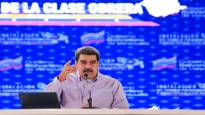The long-standing territorial dispute has received additional rounds due to new oil discoveries. Venezuela has assured that it does not intend to take over the neighboring country’s territory by force.
According to the Venezuelan election authorities, an overwhelming majority, i.e. 95 percent of the voters, supported the position in Sunday’s referendum, according to which a large part of the neighboring country of Guyana should be annexed to Venezuela. The president seeking re-election next year Nicolas Maduro hailed the result as an important step on the road to the return of the territory belonging to Venezuela to the country.
However, Maduro’s government has emphasized that it did not seek a consultative vote to authorize the annexation of the Essequibo region to Venezuela by force.
On the other hand, the Venezuelan government has also published videos claiming that the residents of the Essequibo region want to join the neighboring country.
Guyana’s leadership has assured that it will defend the country’s internationally recognized borders.
– I want to assure all Guyanese that there is nothing to worry about, the country’s president said Irfan Ali on Sunday.
Located in eastern Guyana on the border with Venezuela, the Essequibo region covers more than two-thirds of Guyana’s land area and is home to one-fifth of Guyana’s population.
According to Venezuela, the Essequibo River is the natural border between the countries.
Uncertainty about the number of people who voted
For decades, Venezuela has considered the Essequibo region to be its own. The country appeals to the territorial division during the Spanish rule from the 18th century and does not accept the decision made by the International Court of Arbitration in 1899, according to which the territory belonged to the then colonial master Britain.
Guyana is a former British colony that became independent in 1966. The official language of the country is English.
The International Court of Justice (ICJ) has yet to issue a final ruling on the territorial dispute, but last week it banned Venezuela from taking any steps to change the current situation. Venezuela, on the other hand, does not recognize the jurisdiction of the ICJ in the case.
Like Venezuela, Guyana has significant oil reserves. In relation to the population, they are estimated to be as large as, for example, Kuwait. New oil discoveries have been made, for example, just off the coast of Essequibo.
Venezuela’s opposition questioned the information of the country’s election authorities, according to which about 10 million citizens participated in Sunday’s referendum. Maduro’s longtime rival by Henrique Capriles in reality there would have been only two million people who voted, but they would have answered five different questions each.
